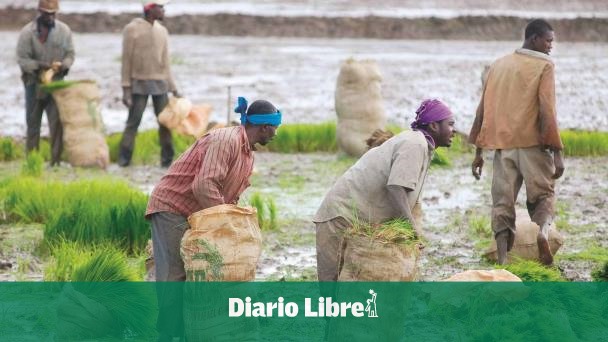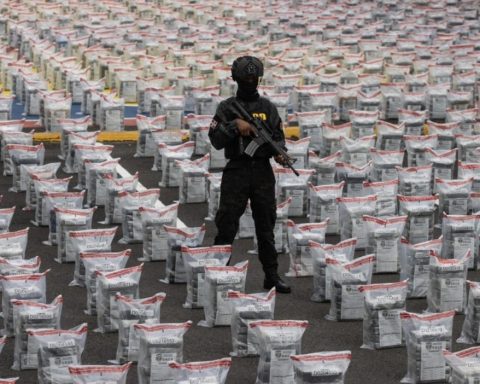Since October 2, the farmers Dominicans who depend on the job of the immigrants haitians for your production are under uncertainty after the weekly deportation plan carried out by the Governmenta problem in which the Ministry of Agriculture and the General Directorate of Migration They share opposite positions to resolve it in the short term.
“If you eat an egg, if you drink a liter of milk, if you consume a pound of meat, if you eat a banana, if you eat a banana, if you buy garlic, if you buy onion… everything you go to buy in a grocery store and it is produced in the Dominican Republic, behind that, there is a foreign workforce,” the president of the Association of Producers of Arroz de Mao, Marcos Rodríguez, to illustrate the panorama.
Most of these workers are in irregular conditions, a situation that recognizes the minister of AgricultureLimber Cruz – who has publicly expressed that he himself has employed undocumented Haitians to work in his estate of bananas.
10 days ago, Cruz was part of a meeting of ministers headed by president Luis Abinader, and in which he said that the general director of Immigration, Vice Admiral Luis Rafael Lee Ballester, was present.
“You know my position: I have said that we must look for practical measures, above all, with those employees that are fixed, that have been around for a long time estate or in any activity, and who go daily to this activity for years. “You can start with these people to get a card and, although they are not legal, they are already identified,” Cruz told Free Diary after indicating that, although the Government It has not created a commission to address this issue; it will hold “periodic meetings until the situation is brought to a minimum.”
The official refers to the issuance of a identification cardwhich brings together the most important details of the worker immigrant: your full name, where you work, who you work with and what agricultural activity you do.
This proposal was rejected by the general director of Immigration, who stated that workers immigrants must take advantage of the ordinary means – requesting a permission of job temporary (TT-1)–, if they want to avoid being repatriated or deported.
“The only thing we are focusing on here is that the General Immigration Law is complied with. That is the procedure that we are going to perform. If people have legal basis to initiate these processes, we would review them; If you do not have the basis to comply with the law, then that is a different matter.”
This is how Lee Ballester responded to a question from the press about it, during a meeting held with rice and banana growers in the municipality of Mao, Valverde province, last Friday.
He explained that, for a worker Haitian be regularized, you must have legally entered the national territory and, once in the country, begin the compliance process established by law.
“All those who are irregularly surprised and who have entered the territory irregularly, will be subject to the repatriation program that we are carrying out,” he concluded.
Deportations and repatriations
Until October 29, the authorities migratory They have redirected 37,985 nationals haitians since the measurement was taken, in which the Government announced the plan to deport 10,000 haitians weekly.
Of that total, 23,745 were deported – returned after being detained and purged by the authorities migratory– and 14,420 were repatriated –arrested and returned for lack of documents–.
Free Diary requested the General Directorate of Migration (DGM) the amount of haitians that have been interdicted in municipalities or provinces with an agricultural vocation, but their communications department reported that they lacked data segmented by locality.
Likewise, it requested a response from its owner regarding the arrests of immigrants haitians in agricultural work, but the entity had not responded at the close of this information delivery.
An alternative already implemented by some sectors
The lack of current documentation provided from Haiti to its nationals abroad is one of the main limitations when regularizing in the country, added to the delays – of up to several years – for the renewal of a permission of job-valid for a maximum period of one year-, once achieved.
For these reasons, sectors such as the banana industry have issued their own meats to identify their workers. The Association Dominican Producers from Banano (Adobanano) has 15,800 workers haitians with this card, which contains all the general information about the worker and your employer, encrypted in a QR code.
Being only an identification document of a company, the authorities of Immigration, the Police and the Army still detain the workers haitiansfor lack of a permission of job temporary issued by the DGM.
“Before they went into the plantations, but not anymore. We have been stopping that for about two months. They are no longer doing it at night, but everyone who is on the street, they are taking away. Even the week “Last year there were plantations that could not be processed, because every time they take the Haitians, if they take the labor, there is hardly any process.”President of Adobanano.
Martínez explained that the last time the workers haitians within the banana sector were regularized in 2017, during a day of the Plan of Regularization executed by the Governmentin which banana businessmen invested 8 million pesos to contribute to the regularization of about 10,000 workers to obtain a permission of job temporary (TT-1).
However, as the year passed, all of these licenses expired.
“That is the problem, that the State did not give another space to renew those permissions“, he noted, after adding that the issuance of documents from Haiti is also an expensive process.
In this agrees the president of the Association of Producers of Arroz de Mao, Marcos Rodríguez, who explained that this card – which came to be known as DO, due to the initials that precede its number – was the immigration category to which foreigners had access in the agricultural sector, which which allowed until its registration in the Social Security Treasury (TSS).
“We have the intrigue of what is going to happen“Because they are not respecting them, they grab them,” emphasized Rodríguez, who understands that this identification was the one that had the most weight for the immigrants will be regularized.
“No one wants to commit to anything, because everything is seen with the political weight nowand the reality of the field is different,” he observed.
The Dominican Republic has around 1,300,000 rice fields available for planting rice. Rodríguez assures that there is, at least, a worker Haitian for every 100 to 150 land tasks.
Taking this reference, the rice sector has the work of between 8,666 and 13,000 workers haitianswho perform tasks throughout the process of production of rice: from land preparation and fertilizing, to cereal milling, including the most specialized tasks, such as the use of tractors and machinery.
Temporary permit job
According to the General Migration Law 285-04, the immigration card worker temporary (TT-1) must contain data such as the names, surnames and photograph of the worker; type of identity document from your country of origin and numbering; date of birth and sex; date and place of entry; permanence period; activity to be carried out and the area in which you reside and work, among other details.
The regulations also establish, in article 49, that the General Migration Council “must establish a quota or amount of workers temporary to be admitted into the country annually, consulting representatives of producers, businessmen and unions, a measure that, apparently, was not contemplated under current conditions.
“The government is a team, it consults; What happens is that sometimes you give an order, and those who execute it do it as if it were a deep river, which is loaded with everything there is,” Cruz emphasized, after emphasizing that, as minister of Agriculturewas aware of the deportation plan of the Government and that, in that sense, he has held conversations with the General Directorate of Migration around the topic. “I take care of my part, and they take care of their part,” he added.
In the first nine months of this year, the DGM has issued 18,373 permissions temporary of job42% of the 43,743 residences temporary issued during this year.
However, the data that Migration shares on its transparency portal does not specify in which sector the migrants work. immigrants foreigners who have obtained these permissions of job.

















